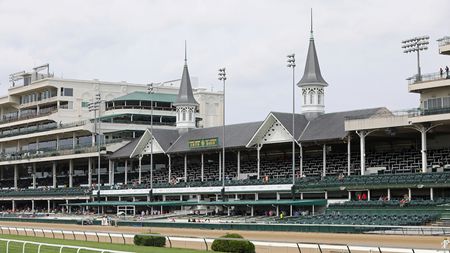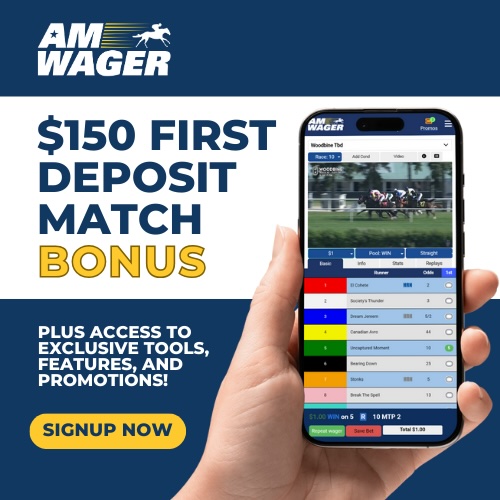
I have seen some highly circumspect ploys in the guise of ambassadorship at the racetrack in my days, but last Saturday, the first one in May, takes the proverbial cake. Wool meet eyes. I am not speaking of breakage, run-ups, or some color-coded roulette.
Rather, I am directly referencing the choice by NBC Sports to relegate the broadcasting of live horse racing to a lesser-watched station. In lieu of actual horses, they showed a re-run and a matchup between historical Triple Crown winners in a what they deemed a “Virtual Kentucky Derby.”
I was left wanting.
The Network explicitly chose for the better part of 3 hours to re-broadcast American Pharoah’s 2015 Derby win hosted by ousted anchor Bob Costas, and then have us watch this virtual race.
You could tell, the looks on Randy Moss and Hall of Fame jockey Jerry Bailey’s faces revealed it, that this was something to lampoon than take seriously. Yes, it was fun to see an EA Sports version of Ron Turcotte and “Big Red” cross the wire with Larry Collmus’s call—I will begrudgingly admit that. I freely disclose that the race was an exhibition meant to raise money for COVID 19 victims, bravo!
But the concept reminds me of one of those unsettling paintings of ex-Presidents, Trump with Lincoln. You know that it cannot and never will happen. Why even try? Jokes abound in the face of serious historical counterfactual inquiry.
I also understand that the running of the Kentucky Derby is sewn carefully into the historical fabric of American culture.
We must face facts, the reason that NBC chose to show the Arkansas Derby races on NBCSN, and not on its’ main channel, was because their benefactor, Churchill Downs Inc. (CDI), did not want its most powerful event to be upstaged.
Plain and simple, this situation is about share price, and nothing else.
Here is the state of affairs, amateur economists and members of the horse racing clan.
Last year, Churchill Downs continued its quest for expansion and domination of not only the horse racing world, but a continued foray into gaming and sports betting. They overextended their monopolistic ventures by expanding their casinos, their online presence, and in the process, they began facelifts of many of their locations outside their home in Louisville.
Mind you, the venerable Twin Spires were also slated to get a major capital project with the construction of a new hotel and historical racing venue.
Like most ideas or plans today, they are on hold. That is because a global pandemic, whether you believe it was engineered or not, spanned Don Pardo’s globe. These lethal times halted everything, and CDI was greatly affected by changes to their schedule.
When I say, “their schedule,” not only thinking of a building expansion, but also their one and only major attraction—The Kentucky Derby.
Without it, what other chips does CDI have—historical racing machines or Turfway Park? Those in no way rival the power of 146, 147, etc. If anything, over the years, CDI has consolidated its commitment to its signature by reducing the number of dates of their meets and has chosen to remain silent on national pushes to organize the sport—the Horse Racing Integrity Act comes to mind.
That is because their share price is tantamount to oxygen. Look for yourself. Before the end of February, they were poised for ever-higher ascendancy. Then the market crashed, and that 165.00, some odd, stock, suddenly became a 52.00 one. Since then, with the rescheduling to September, it has somewhat rebounded into the 100.00 range, but still, it is nowhere near pre-COVID 19.
For many companies, possessing over a multi-billion robust market cap, one would think such a correction would not be that detrimental. After all, casino stocks all went in the toilet and probably, besides energy, took the largest hit as COVID-19 ensued.
CDI is not just a casino stock though. I would argue it is directly tied to everything surrounding The Kentucky Derby. All its major plays hinge on the day of the Derby. It is guaranteed money won. If it does not run, then it has the makings for a catastrophic event.
As April began to unfold, CDI went into triage; game-planning and hedging bets. Their only hope was to focus on finding a timeframe where The Derby could take place. Louisville’s economic heartbeat relies heavily on the cash that is brought and dropped off in the city. But to CDI, The Derby is everything.
Without it, at best, they face nervous shareholders, and at worst, economic ruin.
That is the peril they faced as this past Saturday approached and NBC played along—they had no choice, especially since their Olympic riches this summer also froze.
Aside from these notions concerning share price, may I remind that the state of horse racing, as we speak, hangs in the balance. Turf writers and fans of the sport are looking for silver linings, even at Will Rogers and Fonner Park. There is an opportunity as we speak, right now, to hold on to those enthusiasts and more importantly, attract new ones.
If NBC Sports recognized that, they would have seen the day as a chance to celebrate Thoroughbreds with live ones, not virtual horses; instead, they simply put in a VHS tape and pressed play.
I am not against an homage to The Derby. I missed the “live” broadcast of “My Old Kentucky Home” as the field made its way to the track. The NBC Horse Racing Team works hard at what they do, and I enjoyed their brief messages of hope for a return.
Yet, lest we forget that down in Hot Springs, Arkansas, a powerful set of races were running.
Many across America, that are casual fans of The Derby, probably had no idea, since NBCSN is not a main channel they might come upon. You mean to tell me that a double version of the Arkansas Derby bookending the Oaklawn Handicap, plus Bob Baffert-trained up-and-comers, wasn’t enough of a draw? What’s not to like about the live running of horses on Derby Day?
Oaklawn Park was putting on a show!
How many potential fans did the collective “we” miss out on? The ADW handle was enormous by-the-way–$40 million! Clearly, people were interested.
If we are going to even discuss the continuation of this great sport, headlined by wonderful World-class animals, then we must start making choices for the good of it—true ambassadorship. Not basing decisions in share price, virtual racing, or whether the Home of the Kentucky Derby is being upstaged.
……………………………………………………
J.N. Campbell is a turf writer based in Houston, Texas. His work appears in a number of publications; including the International Journal of the History of Sport, Thoroughbred Daily News, Thoroughbred Racing Commentary, Gallop Magazine, and The Sports Haven.



